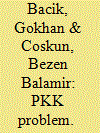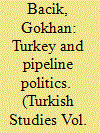|
|
|
Sort Order |
|
|
|
Items / Page
|
|
|
|
|
|
|
| Srl | Item |
| 1 |
ID:
114873


|
|
|
|
|
| Publication |
2012.
|
| Summary/Abstract |
Serif Mardin, one of Turkey's most prominent sociologists, recently stated that 'there is a deep silence about the working class in Turkey'. This article will try to analyse the factors that cause this 'deep silence', which, paradoxically, is observed even by the competing Kemalist and Islamic political actors. In other words, the 'deep silence' refers to the common perspective on the working class of the otherwise different and competing groups. This can be called their solidaristic view, the purpose of which is essentially to provide solidarity among government officials, merchants and peasants that eventually formed the basis of European corporatism. Although it outlines the historical manifestation of the solidarist view, this paper focuses particularly on how Islamic actors maintain that view. This is a problem that requires the examination of various factors around a key question. How is it that competing groups are in harmony in the matter of their ideological positions on the working class?
|
|
|
|
|
|
|
|
|
|
|
|
|
|
|
|
| 2 |
ID:
080367


|
|
|
|
|
| Publication |
2007.
|
| Summary/Abstract |
Terrorism is a pivotal matter in Turkish politics. In this article, a specific terrorist activity, which is still having an impact upon Turkish politics, has been analyzed. It scrutinizes two perspectives of the event. Some actors lean towards a secular/positivist reading of events while others favour a conservative/postmodern reading. This serious factional political debate is possibly just the result that the terrorists had in mind. Being imbued by republican principles, the seculars' claims compel the conservatives to raise defensive points since they are blamed for murdering secular figures and targeting the very essence of the republic. Using different symbolic readings, both sides arrive at opposing conclusions: for the seculars the aim/message of the terror is clear - it is the republic; for the conservatives the aim/message is hidden - destabilizing the country
|
|
|
|
|
|
|
|
|
|
|
|
|
|
|
|
| 3 |
ID:
106610


|
|
|
|
|
| Publication |
2011.
|
| Summary/Abstract |
This article discusses why Turkey has failed to propose an effective political solution of the Kurdish problem. It is argued that Turkey's failure to propose an effective political agenda is the main explanation of why Partiya Karkeran Kurdistan (PKK) insurgency has been rampant for so long. Turkey's commitment to militaristic methods worsened the Kurdish problem by creating deeper social problems. Furthermore, it is argued that the explanations tendered also point out the important factors that may affect the fate of any political agenda on the Kurdish problem, including that of the recent Kurdish initiative of the Justice and Development Party (AKP) government.
|
|
|
|
|
|
|
|
|
|
|
|
|
|
|
|
| 4 |
ID:
072186


|
|
|
|
|
| Publication |
2006.
|
| Summary/Abstract |
This article studies how Turkey has adapted itself to the post?Cold War conditions in functional energy strategy that is practical in connecting Turkey to the several major energy markets and resources. Along with important bilateral agreements, Turkey has managed to connect itself to the main energy markets, including the European energy market, through complex energy projects. In this sense, it can be argued that Turkey has contributed to the emergence of an energy regime in Eurasia.
|
|
|
|
|
|
|
|
|
|
|
|
|
|
|
|
| 5 |
ID:
126679


|
|
|
|
|
| Publication |
2013.
|
| Summary/Abstract |
There is growing Turkish interest in the BRICS, and an ever-growing positive public perception of them. Criticism is rare, as the BRICS are interpreted as an important alternative direction in pursuit of global prestige and a new role for Turkey. Although, there is yet to be a well-defined official strategy, Ankara is interested in increasing its relationship with the BRICS. This paper aims to analyze three intertwined questions that intrude upon the putative relationship: What does "the BRICS" mean? A study of Turkey's position vis-à-vis the BRICS requires an analysis of the latter in terms of their nature, evolution and vision. What are the similarities and differences between Turkey and the BRICS? Is Turkey already a BRICS country? Or, is Turkey only eligible for BRICS membership? What are the pros and cons of a possible Turkish membership of the BRICS consortium?
|
|
|
|
|
|
|
|
|
|
|
|
|
|
|
|
| 6 |
ID:
123428


|
|
|
|
|
| Publication |
2013.
|
| Summary/Abstract |
Turkey is in the process of formulating its new foreign-policy discourse on Sub-Saharan Africa. The emerging discourse is reaching for old themes like Ottomanism and Islamic humanitarianism, and for newer themes such as "the trading-state." The Turkish experience of Sub-Saharan Africa is not rich, and hence the reliance of actors on themes developed in geographical regions quite other than Sub-Saharan Africa. Typically in the early stages of such discourse, its themes reflect images of the major actors more than the realities. As actors' understanding of a subject area improves, the early themes of a discourse are necessarily adjusted to accommodate the issues that emerge in that area. Adjustment happens also in response to various agents' critical commentaries. It is, therefore, a foregone conclusion that the foreign-policy discourse on Sub-Saharan Africa that has emerged so far will undergo constant adjustment.
|
|
|
|
|
|
|
|
|
|
|
|
|
|
|
|
| 7 |
ID:
072824


|
|
|
|
|
|
|
|